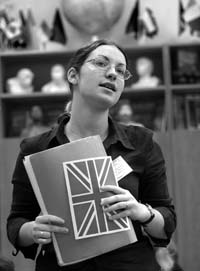Schoolchildren learn to understand the interests of other countries and to lobby those of Ukraine

On March 17 through 19 Kyiv’s schoolchildren worked as ambassadors of twenty-nine countries. To better master the roles distributed by way of a draw, school teams visited embassies and went into the details of political attitudes of various states. The game simulated the activities of the UN General Assembly. High on the agenda was Reforming Education to Raise the Living Standards and Eliminate Poverty (this subject was chosen as part of the UN Decade of Literacy for 2003-2012). Debates were conducted simultaneously in three committees and two commissions which passed resolutions to that effect. Each committee or commission formed two or three coalitions on the basis of a common viewpoint on a certain problem. It befell the students of Kyiv’s Universum Lyceum to represent Ukraine, while the role of the UN Secretary General was assigned to Yury Zinchenko from the Kyiv Lyceum of Business. In his opinion, “Ukrainian youth and the Ukrainian elite must show and prove that we are highly knowledgeable about global problems and see our Ukraine as a full member of the world community.”
Incidentally, the Kyiv Lyceum of Business has been playing the UN for five years, inviting participants from urban and rural schools of all the regions of Ukraine. Over this time, the lyceum has received 350 delegations, with almost 2000 schoolchildren being involved in the game.
Incidentally, this kind of game has been conducted on the international level for the past 35 years. Ukraine first participated in 2003. The conference, held in The Hague, discussed the human rights issue. Our team, consisting of the students of Kyiv’s Lyceum of Business and Pechersk School, represented a tiny country Tuvalu situated on islands off Australia, with a population of just 10,000. Nevertheless, the children managed to present the case of this small nation so convincingly that this drew attention to their own country, which nobody expected to make such a spectacular show. Our young people displayed a surprisingly fluent command of English, the ability to speak in diplomatic terms, and highly competent understanding of international problems. They took up the cudgels for a dwarfish country, warning the great powers that offshore oil production in this area will wipe out the islands and the inhabitants with their inimitable culture in fifty years. Valentyna Nidzelska, coordinator of the Model UN Kyiv-2004 game, deputy principal of the Kyiv Lyceum of Business, coordinator oft he four all-Ukrainian Model UN games, and participant of the 35th International Hague Conference, recalls, “There were seven Ukrainians among the 7000 delegates. Our country called up an association with soccer player Shevchenko, the Chornobyl disaster, and Russia. We brought over discs about Kyiv and books about Ukraine. We were accepted as a nation capable of adequately behaving in a civilized society. When we announced we were planning to hold this kind of an international conference in Ukraine, this raised questions whether there is electricity in our homes and hot water in our faucets, whether we have good hotels, roads, and transport...
To participate in a UN General Assembly simulation, children have to do much preparatory work. They are taught by special methods such not-so-easy procedures as lobbying, the art of conducting behind-the-scenes discussions and debates, making political statements, delivering introductory speeches, and passing resolutions. At first, the pupils study theory, then they are invited to a game as observers, and only after this as “ambassadors” or even higher functionaries. Teachers maintain that when our children get the viewpoints of other countries’ representatives, they begin to better understand the ways according to which the most developed countries became affluent as well as what we, Ukrainians, should do to achieve similar successes.
The latest game brought up sharp debates over the Iraq problem. For some reason, the children who represented Iraq unambiguously sided with the United States and formed a coalition with it in all the committees, which runs counter to the realities of today’s life. The schoolchildren thought this attitude would allow “their country” to satisfy its interests because the “US” was ready to offer educational programs and help reconstruct what was ruined. This coalition believed they must make effective use of the US financial potential. The countries that sided with the Netherlands had a different point of view: Iraq should be given a chance to tap its inner resources; it should cooperate with European countries as an equal partner without relying too much on their material assistance. The children’s Disarmament and National Security Committee discussed the issue of global disarmament and proposed that this be done gradually on a proportional basis. They asked a relevant question, “What can force a country to take this step?” As to the prevention of terrorism, it was suggested that governments closely watch and timely react to the instances of mass discontent in order to relieve tension and preclude terrorists from taking advantage of this discontent.






